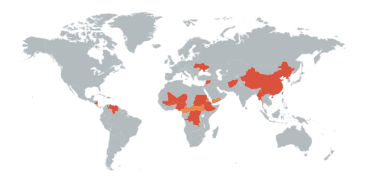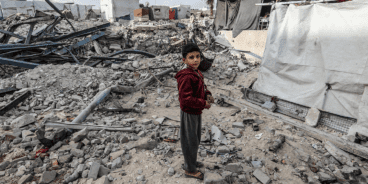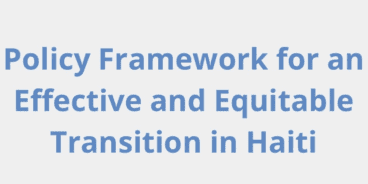
Atrocity Alert No. 134: South Sudan, Democratic Republic of the Congo and Nicaragua
Atrocity Alert is a weekly publication by the Global Centre for the Responsibility to Protect highlighting situations where populations are at risk of, or are enduring, mass atrocity crimes.
Widespread sexual violence in South Sudan despite peace agreement
Between 19 November and 1 December at least 157 women – including girls under the age of 10 and women over the age of 65 – were raped, sexually assaulted, and brutally beaten as they traveled to a food distribution site in Bentiu, South Sudan. According to Médecins Sans Frontières staff who treated the women, the perpetrators included groups of up to 20 armed men, some of whom were dressed in military uniforms. Many of the women and girls were also robbed of their clothing, shoes and food ration cards.
Throughout the conflict in South Sudan rape has been used as a weapon of war and as a means of collective punishment against perceived ethnic enemies. In their latest report, published on 26 November, the UN Panel of Experts on South Sudan highlighted “alarming levels” of sexual and gender-based violence despite the historic signing of the Revitalized Agreement on the Resolution of the Conflict in South Sudan (R-ARCSS) on 12 September.
The head of the UN Mission in South Sudan (UNMISS), David Shearer, condemned the Bentiu attacks and emphasized that the South Sudanese government must ensure the safety of all civilians. UN Undersecretary-General for Humanitarian Affairs Mark Lowcock, UNICEF Executive Director Henrietta Fore and UN Population Fund Executive Director Natalia Kanem called upon authorities “to publicly denounce the attacks” and noted that in the first half of 2018, approximately 2,300 cases of gender-based violence were reported to medical and aid groups in South Sudan. Over 20 percent of these cases involved violence against children.
The attacks in Bentiu took place during the 16 Days of Activism against Gender-Based Violence Campaign, part of a global movement launched in 2008 by the UN Secretary-General to confront the international pandemic of violence against women and girls. Attacks like those at Bentiu may also amount to war crimes and crimes against humanity.
On 4 December Secretary-General António Guterres said that the government of South Sudan must confront “these crimes through investigation and prosecution of perpetrators, including through the operationalization of the Hybrid Court.” In keeping with the R-ARCSS, it is essential that the government of South Sudan comprehensively address the culture of impunity, brutality and armed violence that enables ongoing sexual and gender-based violence.
Trial for perpetrators of mass rape begins in the Congo
The trial of Ntabo Ntaberi Sheka, leader of the Nduma Defense of Congo (NDC) militia, began on 27 November at a Military Court in North Kivu, Democratic Republic of the Congo (DRC). Both Sheka and Seraphin “Lionso” Nzitonda – of the Democratic Forces for the Liberation of Rwanda (FDLR) armed group – are being prosecuted for war crimes and crimes against humanity, including mass rape and child recruitment, perpetrated under their command in the Walikale, Pinga and Masisi territories of North Kivu between 2010-2014.
Under Sheka’s leadership the NDC was responsible for the rape of at least 387 civilians, including 64 children, during attacks on villages in Walikale territory between 30 July and 2 August 2010. The DRC government issued a warrant for his arrest for crimes against humanity during 2011 and he was also placed on a sanctions list by the UN Security Council. Despite these actions, insecurity and impunity in eastern DRC allowed the NDC to continue perpetrating atrocities – including targeted killings, torture and rape – and Sheka was able to run as a candidate in legislative elections during 2011 without being arrested. Sheka surrendered to the UN Mission in the DRC (MONUSCO) during July 2017.
The trial is taking place shortly after the awarding of the Nobel Peace Prize to Congolese doctor Dennis Mukwege brought global attention to the issue of conflict-related sexual violence in the eastern DRC. The government must ensure that all those participating in the trial – including victims and witnesses – receive adequate physical protection, as well as appropriate psychosocial support to avoid re-traumatization as they seek justice.
The UN Human Rights Council and systematic violations in Nicaragua
On 22 November eleven UN human rights experts expressed serious concern about ongoing widespread intimidation, threats and physical violence in Nicaragua against perceived critics of President Daniel Ortega, his wife and Vice President, Rosario Murillo, and his government. As a result of the ongoing human rights crisis, approximately 22,000 Nicaraguans have already fled to neighboring countries.
Since April 2018 over 300 individuals have been killed and at least 580 remain in detention due to involvement in a wave of demonstrations that began in opposition to government-imposed pension cuts. An August 2018 report by the Office of the UN High Commissioner for Human Rights documented extrajudicial killings, enforced disappearances, sexual violence, and torture, warning that high-level state officials acted “in a joint and coordinated manner” with pro-government armed elements.
The expulsion of the UN Human Rights investigative team following their August report, and the unwillingness of the government to cooperate with regional and international human rights mechanisms, contributes to an enduring risk of potential mass atrocity crimes.
The UN Human Rights Council (HRC) should convene a special session to discuss how it can cooperate with regional organizations to help monitor, mediate and end the human rights crisis in Nicaragua. During the session the HRC should adopt a resolution addressing state-sponsored violations and abuses, and emphasizing the need to actively prevent potential crimes against humanity.
Related Publications


Atrocity Alert No. 419: Israel and the Occupied Palestinian Territory, Global Landmine Report and Crimes Against Humanity Treaty
